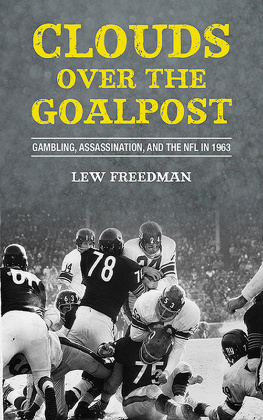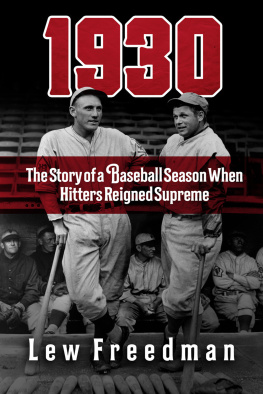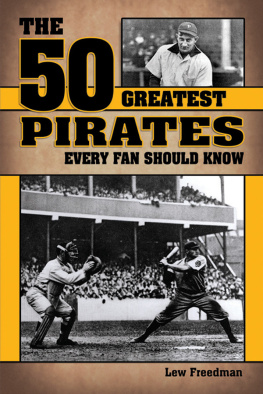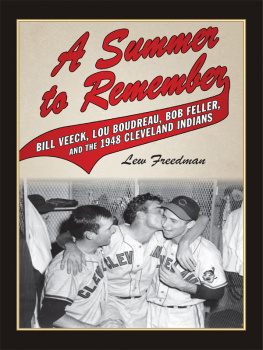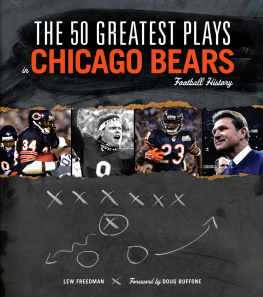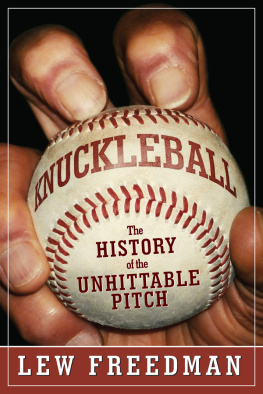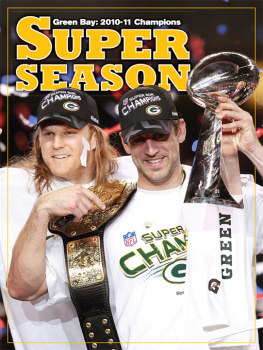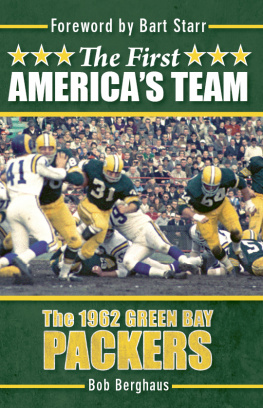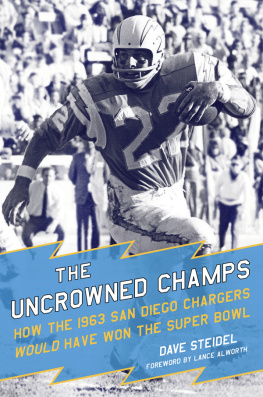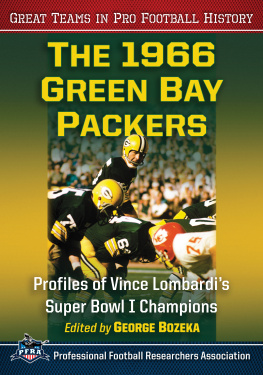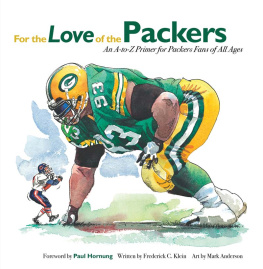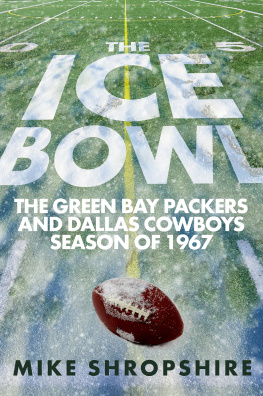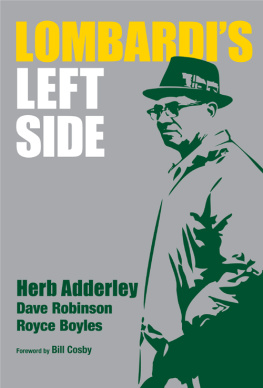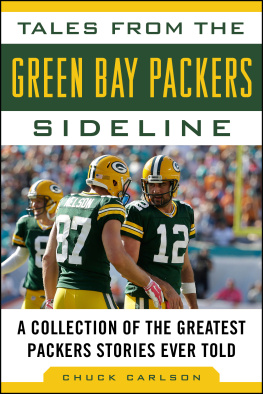

Copyright 2013 by Lew Freedman
All Rights Reserved. No part of this book may be reproduced in any manner without the express written consent of the publisher, except in the case of brief excerpts in critical reviews or articles. All inquiries should be addressed to Sports Publishing, 307 West 36th Street, 11th Floor, New York, NY 10018.
Sports Publishing books may be purchased in bulk at special discounts for sales promotion, corporate gifts, fund-raising, or educational purposes. Special editions can also be created to specifications. For details, contact the Special Sales Department, Sports Publishing, 307 West 36th Street, 11th Floor, New York, NY 10018 or sportspubbooks@skyhorsepublishing.com.
Sports Publishing is a registered trademark of Skyhorse Publishing, Inc., a Delaware corporation.
Visit our website at www.sportspubbooks.com
10 9 8 7 6 5 4 3 2 1
Library of Congress Cataloging-in-Publication Data
Clouds over the goalpost : gambling, assassination, and the NFL in 1963 / Lew Freedman.
pages cm
ISBN 978-1-61321-398-8 (hardcover : alk. paper) 1. Football--United States--History--20th century. 2. American Football League--History. 3. National Football League--History. I. Title.
GV954.C58 2013
796.332'6409046--dc23
2013019397
ISBN: 978-1-61321-398-8
Printed in the United States of America
CONTENTS
INTRODUCTION
T HE YEAR 1963 was an extraordinary one for pro football. To reference the great Clint Eastwood film, it included the good, the bad, and the ugly. Great football was played, with the three most prominent achievers in the National Football League that season of fifty years ago being the three most famed, revered and pretty much longstanding teams, the Chicago Bears, Green Bay Packers, and New York Giants.
With all the positives that happened that season, specific events unfolded on and off the field that affected the league, both directly and indirectly.
Pro football in 1963 was only five years removed from the most heralded and important game in the sports history: the sudden death championship game played between the New York Giants and Baltimore Colts. The result itselfthe Colts victoriouswas not of significant note to the sport. With that being true, however, the way it was accomplished, with it being the first title game determined in overtime and the audience that attracted, helped propel football into a new, more modern era.
It had been a long time coming. For decades, pro football ranked lower in popularity on the American sports scene than baseball, horse racing, boxing, and college football. ColtsGiants raised the status of the sport to a new level, and made it abundantly clear what had previously been theorized: That pro football was a gift to television programmers, who in turn had the keys to the vault to make owners in the NFL rich.
The game was growing and television helped it along. Cities that did not have their own team now wanted one, and the demand for expansion led to the creation of the American Football League in 1960; a league that, within a decade, was absorbed in its entirety as part of the National Football League. In 1963, the AFL existed more or less in a parallel universe, playing its own schedule (mostly in cities that did not have NFL teams). But the AFL played the role of irritant in a high-stakes competition for talent.
A merger lay in the future, but a savvy young NFL commissioner, who had served his apprenticeship in the league as the Los Angeles Rams public relations director and general manager, was a man for his times. Pete Rozelle understood the importance of national television, equal distribution of TV revenue to the biggest and smallest cities in the league, and parity in the sport. In 1963, Rozelle was still learning on the job, but he played a huge role in several of the years most important events; especially those that took place off the field.
Not long afterwards, in a black eye for the league, an incident that surprised and shocked innocent-minded fans, required Rozelles attention. In a dramatic decision, Rozelle suspended Green Bay Packer star running back Paul Hornung, one of the leagues most visible players and its points record-holder, and Detroit Lions star defensive tackle Alex Karras. They were accused of gambling, and specifically betting on NFL games. They would not be allowed to play in 1963.
This was the year when one of the NFLs marquee defensive players, the famed and colorful Gene Big Daddy Lipscomb, was found dead less than six months before the start of the 63 season, apparently of a heroin overdose with a needle stuck in his arm.
In September, in a development that clearly came under the heading of the goodif not the beautifulthe Pro Football Hall of Fame opened its doors in Canton, Ohio, and inducted its first class. As Canton was the city where the NFL was founded, it was a logical place to enshrine and honor the greats of the game.
If Rozelle acted as an impartial district attorney of sorts in his willingness to prosecute Hornung and Karras in April, his stewardship and statesmanship took a hit in November. On November 22, 1963, a day that shocked the nation, President John F. Kennedy was assassinated in Dallas, Texas. It was a Friday, and although other sports leaguesincluding the American Football Leagueall cancelled their scheduled games for the weekend, Rozelle made the ill-advised choice for the NFL to play on that Sunday.
For all of the difficult issues to chew onperhaps a foreshadowing of Americas sports future when the games became evermore-interwoven with the issues and politics of the daypro football was at its best when its young men of strength, speed, and talent roamed the playing field.
While the American Football League was fighting for its own existence, it was growing stronger by the season and offering better entertainment by sewing up fresher players. The AFL championship game pitted the San Diego Chargers against the Boston Patriots. The game was no classic, but it served as part of the increasing body of evidence that the AFL was here to stay, and it showcased a wide variety of talented football players.
The NFL could badmouth the AFL all it wanted, but fans were flocking to games and sat in front of their television sets, enjoying the wild brand of offensive football on display.
On the field, the NFL offered a great show in 1963. A gaptoothed, loud-voiced migr from the East Coast had arrived in frigid Green Bay, and restored the glory of the past for the smallest town in the league. The Packers, whose fans own stock in the club, were (and still are) the only team to be owned this way, unlike those that are owned by a solo rich man (or corporation). With Vince Lombardis arrival, he established a budding and continuing dynasty overnight.
By 1963, the Packers had played in the previous three NFL title games and were two-time defending champions. Even without Hornung, they figured to be the class of the league... though not if the Chicago Bears had a say in the matter. The Bears and Packersin the same Western Divisionfeatured the oldest rivalry in the sport. Their team founders were there at the founding of the league in the tight quarters in Canton. Lombardi may have been the second coming in Green Bay, but George Halas, the man who founded the Bears and had been involved in every major decision that the NFL made since 1921, was still coaching his team.
The Bears were a veteran squad, and did not hold the Packers in awe. Many of the stalwart Bears were also in the lineup in 1956, which was the last time Chicago reached the championship game. They lost that one to the New York Giants, which were another veteran team and the class of the NFLs Eastern Division in 1963.
Next page
